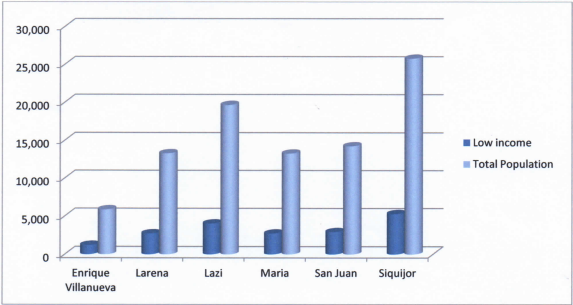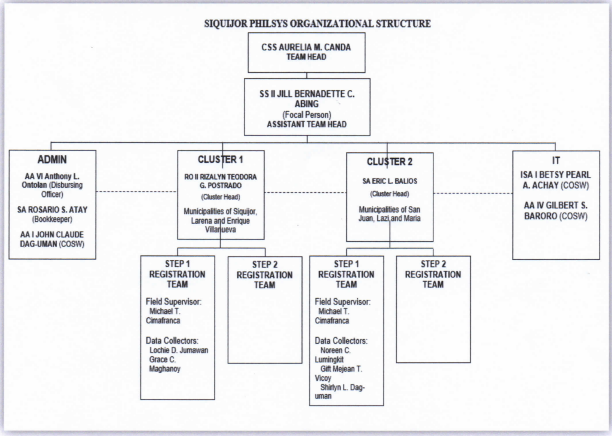In pursuit of the Philippine’s transition to digital economy, PSA Siquijor began registering identified low-income families of the province for the Philippine Identification System (PhilSys), aiming to provide financial access to unbanked Filipinos and facilitate seamless delivery of government services.
This year, PSA targets to register 70 million Filipinos and resident aliens nationwide. To attain this goal, PSA Siquijor ventured on this endeavor undertaking the first step of the registration process.
Step 1 Registration involves the collection of demographic data, such as the name, permanent address, date and place of birth, sex, marital status, contact details, and blood type of the target registrant. To comply with health and safety protocols, PSA data collectors will conduct house-to-house visit. Each data collector gathers the demographic profiles of the target registrants and record these data through digital tablets. The information will then be sent directly to a secured PhilSys database. By the end of this step, registrants will be issued an appointment slip that they will need to proceed with Step 2 of the registration at a later date.
Since advance data collection is administered ahead of time, Step 2 Registration or the biometric capturing, such as fingerprints, iris scans, and front-facing photographs, and validation of supporting documents will be done in a registration site which is set to start in May 2021.
Partnership with LGUs
In order to fast track the registration, PSA has ensured a continued progress in the establishment of partnerships with the local government units (LGUs) to assure protection and security of the data collectors and field supervisor in their field interview to conduct the Step 1 Registration. While the PSA leads the overall registration process, the LGU shall then provide assistance, information dissemination, and security of the data collectors in the identified barangays with high poverty incidence.
Low Income Families First
The first target registrants for the Step 1 Registration are the low income families of barangays with high poverty incidence as identified by the Municipal Planning and Development Office and the Department of Social Welfare and Development.
Figure 1: Number of low income families per municipality

Of the six (6) municipalities, the Municipality of Siquijor recorded the highest number of low income families while the Municipality of Enrique Villanueva recorded the least number.
Step 1 Registration Team
Amidst the challenges brought by COVID-19 pandemic, PSA Siquijor took the initiative to conduct Step 1 Registration last January 18, 2021 aiming to register more than 18,900 individuals in identified far-flung areas in the province by the end of March this year. To carry out these responsibilities, Step 1 Registration hired personnel comprises of one (1) field supervisor, five (5) data collectors, one (1) administrative assistant, and one (1) information system analyst for the province. On average, each data collector targets to register sixty (60) individuals per day.
As emphasized by RSSO 7 Regional Director Ariel E. Florendo, the relevance of having an organizational structure should be highlighted so as to consider area of assignments and strategy implementation relative to the conduct of the Step 1 Registration for PhilSys. Hence, two clusters were created. RO II Rizalyn Teodora G. Postrado leads Cluster 1 and SA Eric L. Balios for Cluster 2, and SS II Jill Bernadette C. Abing is the Focal Person of PhilSys for PSO – Siquijor.
Figure 2: Siquijor PhilSys Organizational Structure

Health and Safety Measures
In adherence to health and safety protocols set by the IATF, PSA Siquijor considered several critical factors, which includes the number of active cases of COVID-19, security of the location of target barangays, and ease of mobilization of the registration staff.
In this regard, the Step 1 Registration staff and hired personnel are provided with PPE supplies and hygiene kits to minimize the risk of exposure and prevent transmission of COVID-19. To ensure the safety of the hired personnel, social distancing, wearing of face mask, body temperature monitoring, and sanitation of materials are being practiced at all times.
Technical Notes
Republic Act No. 11055, otherwise known as the Philippine Identification System Act, aims to establish a single national identification system for all citizens and resident aliens of the Republic of the Philippines. This was signed into law on August 2018 by President Rodrigo Roa Duterte. This I.D. shall serve as a valid proof of identity as a means of simplifying public and private transactions and shall be an economic and social platform that promotes seamless social delivery for both public and private services.
The PhilSys project emphasizes inclusive coverage, enabling access to the most vulnerable groups such as the poor people living in geographically isolated and disadvantage areas, indigenous peoples, and persons with disabilities. Specifically, it aims to (1) make services more accessible, (2) promote ease of doing business, (3) enhance the integrity of services and reduce fraud, (4) enable and promote participation and trust in digital government and the digital economy, and (5) empower Filipinos with greater control over their personal data.
Concept/s and Definition:
Mobile Registration Center – is a transportable registration center set up inside or outside the premises of PSA or other partner agencies to conduct registration services for a temporary period of time less than twelve (12) months
Personal Information – refers to any information whether recorded in a material form or not, from which the identity of an individual is apparent or can be reasonably and directly ascertained by the entity holding the information, or when put together with other information would directly and certainly identify an individual
Partner Agency – a government agency that is mandated by RA 11055 to act as a registration center for PhilSys and other institutions designated by PSA
Pre-registration – refers to the process where the applicant fills out the PhilSys Registration Form through the PhilSys web portal and selects his/her preferred registration date and PhilSys Registration Center through appointment system. This process shall generate the accomplished PhilSys Registration Form with a transaction number and barcode which must be printed and presented to the screener together with his/her supporting documents to continue with the registration process
Registration Center – refers to the necessary facilities to capture both demographic and biometric information, required for PhilSys as provided in Section 8 (A) of the IRR. PhilSys related services such as data updates and changes, credential distribution and grievance redressal shall also be made available
Resident Alien – refers to an individual who is not a citizen of the Philippines but has the appropriate immigrant visa or established residence in the Philippines for an aggregate period of more than one hundred eighty (180) days.
(SGD.) AURELIA M. CANDA
Chief Statistical Specialist

